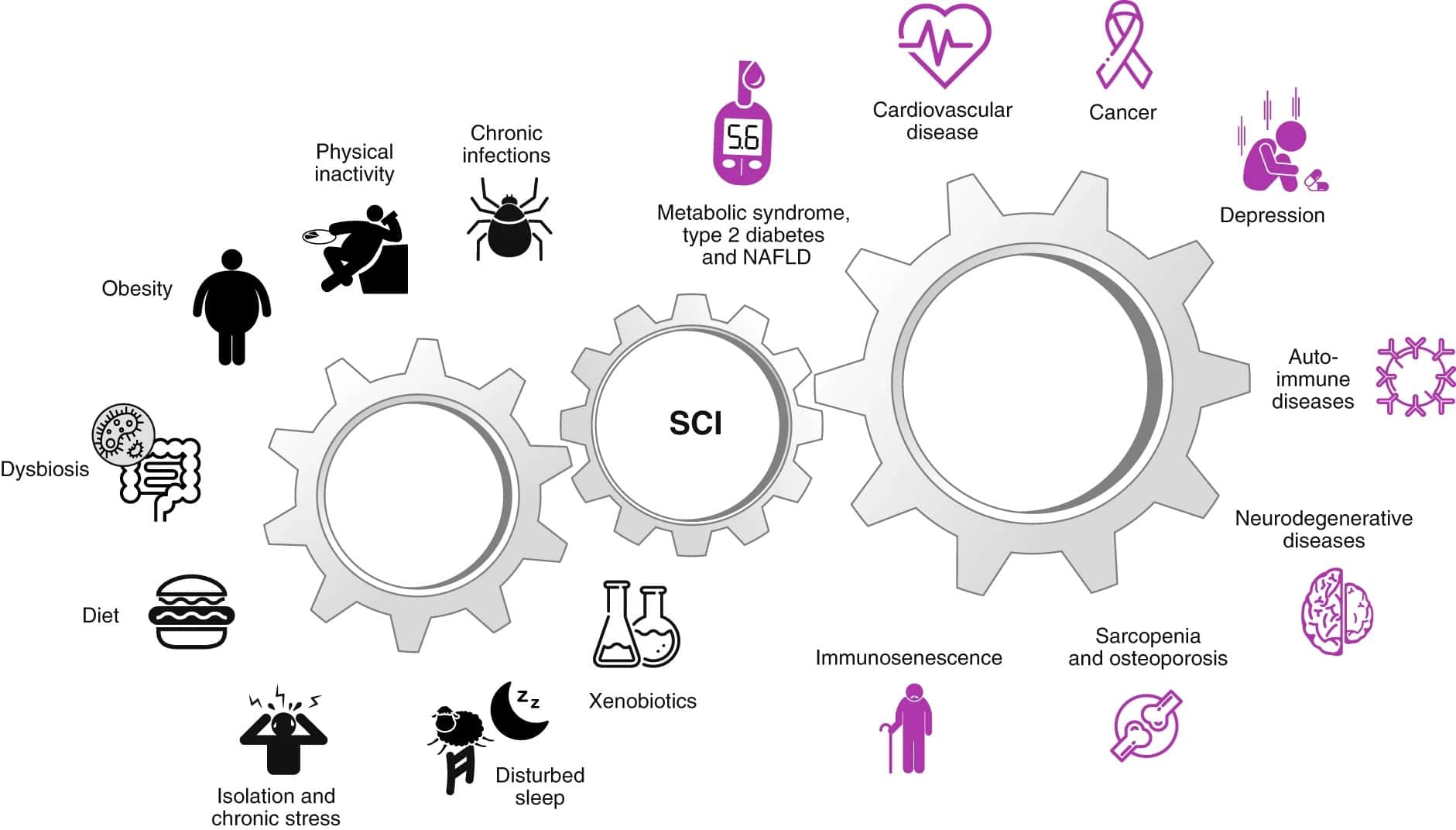At Dr. Roze BioHealth Clinic, we understand the importance of managing chronic inflammation. We offer a variety of non-invasive techniques to help our patients manage their chronic inflammation. Our team of experts is dedicated to providing comprehensive overviews of available strategies and discussing various options and approaches for chronic inflammation management.
Overview of Chronic Inflammation and Non-Invasive Techniques
Chronic inflammation is a persistent, protracted bodily response to harmful stimuli, such as pathogens, damaged cells, or irritants. This prolonged state of inflammation can lead to various chronic diseases like arthritis, cancer, and heart disease. Non-invasive techniques for detecting and managing chronic inflammation have proven crucial in mitigating these health risks. These include blood tests for biomarkers like C-reactive protein (CRP), imaging techniques such as MRI and CT scans, and lifestyle modifications including diet and exercise. Such strategies offer a comprehensive approach to handling chronic inflammation without the need for invasive procedures.
One of the major challenges in managing chronic inflammation is its subtle nature, often causing no symptoms until it has already caused significant damage to tissues and organs. Therefore, early detection is crucial for effective intervention. Blood tests are the most commonly used non-invasive technique for detecting chronic inflammation. They measure levels of various biomarkers that indicate an ongoing inflammatory response in the body. These biomarkers include CRP, cytokines, and certain white blood cells. Elevated levels of these markers may indicate chronic inflammation and the need for further evaluation and treatment.
Benefits of Non-Invasive Care for Chronic Inflammation Management
Non-invasive care for chronic inflammation management presents several advantages, making it an excellent choice for many patients.
- No Surgical Risks: Non-invasive procedures eliminate the risk of complications such as blood clots, infections, or adverse reactions to anesthesia which are associated with surgery.
- Less Pain and Discomfort: These procedures are generally less painful, reducing the need for pain medication.
- Cost-Effective: They are often less expensive than invasive procedures, making them accessible to a larger group of patients.
- Low Risk of Scarring: Non-invasive treatments do not require incisions, reducing the risk of scarring.
Additionally, non-invasive care for chronic inflammation management can provide long-term relief without causing any harm to surrounding tissues or organs. It also allows patients to avoid potential complications that may arise from invasive procedures, such as nerve damage or organ perforation.

Causes and consequences of chronic inflammation
Options for Non-Invasive Chronic Inflammation Management from Dr. Roze BioHealth Clinic
At Dr. Roze BioHealth Clinic, we offer a comprehensive suite of non-invasive treatments designed to manage chronic inflammation, enhancing your overall health and wellness. These therapies are designed to help your body fight inflammation naturally, reducing reliance on medications and their associated side effects.
- Acupuncture: This traditional Chinese medicine technique is believed to balance the body’s energy flow, and research has shown beneficial outcomes in inflammation reduction.
- Nutritional Counselling: Specific dietary changes can significantly impact inflammation levels. Our expert nutritionists will provide personalized advice tailored to your needs.
- Physical Therapy: Regular, targeted exercise can help reduce inflammation. Our therapists will design an exercise routine that suits your physical condition.
- Stress Management Techniques: Chronic stress can exacerbate inflammation. We offer interventions such as mindfulness training and yoga to help manage stress levels.
- Herbal Supplements: Certain herbs have anti-inflammatory properties. Our clinic uses safe, proven herbal supplements as part of a comprehensive inflammation management plan.
- Chiropractic Care: Gentle spinal manipulations can help alleviate inflammation in the body. Our licensed chiropractors will create a personalized treatment plan to address your specific needs.
- Massage Therapy: Regular massages can help improve circulation and reduce inflammation. Our skilled therapists use various techniques to target inflamed areas and promote healing.
In addition to these non-invasive treatments, we also offer educational resources and support to help you make lifestyle changes that can further reduce inflammation. Our approach is holistic, focusing on improving your overall well-being rather than just treating symptoms.
At Dr. Roze BioHealth Clinic, our goal is to provide you with safe and effective options for managing chronic inflammation. Our team of practitioners will work with you to create a personalized treatment plan that addresses your unique needs and goals. Say goodbye to relying solely on medications and take a step towards a healthier, inflammation-free life with our non-invasive treatments.
Book an appointment today and start your journey towards better health! So, what are you waiting for? Contact us now to schedule a consultation with one of our experts and begin your journey towards optimal health.
Understanding the Role of Nutrition in Chronic Inflammation Management
Chronic inflammation is a prolonged and persistent form of inflammation that can last for several months and even years. It plays a pivotal role in the development of various diseases such as heart disease, diabetes, cancer, and arthritis. However, recent research has shown that nutrition can significantly influence the management of chronic inflammation. A well-balanced diet rich in fruits, vegetables, lean proteins, and whole grains, coupled with a reduction in processed foods and refined sugars, can help mitigate inflammation. Additionally, certain foods, such as fatty fish rich in omega-3 fatty acids and berries packed with antioxidants, have potent anti-inflammatory properties. Therefore, understanding the role of nutrition in managing chronic inflammation can be a powerful tool in disease prevention and overall health promotion.
Tips for Creating a Positive Relationship with your Healthcare Provider for Chronic Inflammation Management
Creating a positive relationship with your healthcare provider is essential for effective chronic inflammation management.
The following tips can help:
- Open Communication: Establish a rapport with your provider where you can freely discuss your concerns and symptoms. Make sure you’re being heard and understood.
- Honesty: Be sincere about your lifestyle, diet, and the extent of your symptoms. This helps the provider make accurate assessments.
- Follow-up: Regularly connect with your provider to update them about your progress and any changes in your condition. Consistent follow-ups help in optimizing your treatment plan.
- Education: Educate yourself about your condition. This will allow you to have more informed discussions with your provider, leading to better care.
- Advocacy: Don’t hesitate to advocate for yourself if you feel something isn’t right. It’s your health on the line, and your thoughts and feelings are important.
- Positive Attitude: Stay optimistic and maintain a positive attitude throughout your treatment journey. This can greatly impact your overall well-being and aid in the management of inflammation.
- Collaboration: Work together with your provider to come up with a treatment plan that works best for you. Remember, it’s a team effort.
- Patience: Be patient with your progress and with your provider. Chronic inflammation management takes time, and it’s important to trust the process.
- Self-care: Don’t forget to prioritize self-care. This includes taking care of your physical, mental, and emotional health. A positive relationship with your provider is not possible without taking care of yourself first.
- Gratitude: Lastly, don’t forget to show gratitude towards your provider for their efforts and dedication towards helping you manage your chronic inflammation. A simple thank you can go a long way in strengthening the positive relationship between patient and provider.
By implementing these tips, you can create a positive relationship with your healthcare provider that will not only aid in managing chronic inflammation but also improve your overall quality of life. Remember to always communicate openly, be honest, and prioritize self-care in your journey towards better health. So, make sure to follow these tips for an effective management of chronic inflammation through a strong patient-provider relationship. Keep in mind that this is a continuous process and requires effort from both sides to maintain a positive and productive partnership. Your healthcare provider is there to support you, so don’t hesitate to reach out and work together towards better health. Now go forth with confidence and take charge of your chronic inflammation management journey!

